- Home
- William Styron
A Tidewater Morning Page 9
A Tidewater Morning Read online
Page 9
“Jeff, I just don’t think I can give her any more,” the doctor replied. They were all in the hallway now—except for Miss Slocum—out of my mother’s hearing, and I had shrunk back into the shadows near my own room, where I listened to the forbearant, expository voice. “As I told you this afternoon, people often develop a kind of tolerance, they become sensitized after long dosage. And this is what’s happened to Adelaide. She’s beginning to fail to absorb the injections. And also I’m simply having difficulty finding a place where the injections themselves don’t cause pain. She’s become so desiccated in places, you see.” He paused. “What I will try to do is give her something else—cocaine orally, if she can possibly swallow it and keep it down. It’s sometimes fairly effective. I can also try some intramuscular …” He went on a bit more, blah blah blah, unintelligible.
“Please do anything, Tom. There must be some way to blank out that—” He saw me at the instant I saw him. “Paul—” he said. Papa was not the calmest of men, philosophically inclined though he was. Fortunately his life had been free of too many disturbances. He had little natural aplomb, and even minor crises tended to get him rattled, unstrung. His thin face possessed a delicate, professorial quality more suited to reflection than to confrontation; when really agitated he got hot-eyed and, to me, a bit scary, and at the moment I felt that I had never seen him so haggard-looking, so disheveled to the forlorn depths of his spirit. “Paul, son,” he said as gently as he could, “you should be in bed.”
“I might as well stay up, Papa,” I said. “It’s almost two. I’ve got to carry papers at five.”
“You don’t have to carry papers this morning.”
“Papa …” I hesitated, not knowing how to reply. Why, Papa? Why not this morning, Papa? Why? Why not?
“Listen, Paul, son…” He hesitated too, for the briefest instant, until Florence came to the rescue.
“Mr. Jeff,” she said, “why don’t you let dat boy carry his papers dis mornin’? Dey be expectin‘ him up at de sto’.” It was her way of uttering a nontruth that cried out to be said, at least at that instant in the hallway with its mood of desperate irresolution, and I knew it was meant for me. Everything gone be all right, baby. “Mr. Quigley, he fire dat boy if you don’t let him go.”
“Then okay, son,” Papa said in a parched voice, “but I still want you to try to get some sleep.”
There was a kid my age named Bruce Watkins, also one of Mr. Quigley’s half-dozen paper-route workers, who woke me every Sunday at dawn by throwing a handful of pebbles up at my window screen. That morning I was aroused from a murky half-sleep by the pattering noise, like a burst of sudden rainfall, which sent me upright in bed with a sensation of waking exhausted in a foreign place. I waited for the sound—the unspeakable—but heard nothing. After I put on my shorts and sport shirt and started on my way downstairs, I saw that Miss Slocum, mouth ajar, snoring faintly, was dozing at my mother’s bedside. The doctor had gone. The door to my father’s bedroom was closed, and this meant that he was asleep for a few minutes or perhaps merely trying to sleep in the stupefying heat, which had, even at that hour, an unnatural, almost man-made intensity, like that of the boiler room of a naval ship into which I had once been allowed to descend. Outside on the lawn the heat lay as if imprisoned in a vast scoop, breezeless, unrelieved by the disappearing night, so that the grass, which should have been drenched with dew, remained dry and brittle beneath my sneakers, and the sycamores had a drooping, withered look as the first light silvered their leaves. It was the kind of southern morning when people, waking, stirred and whispered, “Oh, Jesus.” The air was sticky and ominous, the heat of the new day coming on like a cataclysm. I felt dizzy from the lack of sleep; already sweat streamed down my back. Bruce and I met at the curb and walked along the sleeping village streets toward the store. For a moment we said nothing. He was from one of those neighbor families of a cheerfully unkempt multitude I so envied. He was taller than I by six inches, older by a year, and I coveted, too, the sprinkling of facial fuzz, the occasional androgynous dip of his voice from soprano into croak, even the rosy patch of acne around his nose. He was becoming a man; I still felt in the green grip of childhood.
“How’s your mama?” said Bruce finally. I sensed in his manner uncertainty, sympathy, and obligation all at once. I felt that he didn’t want to talk about it any more than I did; but he knew, as I knew, that there was no way to avoid it.
“She’s real sick, I guess,” I replied, and then after a pause: “I mean, it’s real bad.”
“I sure am sorry,” he said, and that was that: we both realized the subject was closed. And we leaped to the most obvious subject at hand.
“How much did you take home Friday?” Bruce asked.
“Dollar fifteen. How about you?”
“Dollar thirty. Cheap bastard. You know what Wilson told me yesterday? He told me a real interesting thing.”
“What’s that?” I said.
“Well, he said that he’s been lifting things off Quig-ley for two weeks.”
“Lifting things?” I said. “What kind of things?”
“Oh, you know,” said Bruce, “all kinds of things. Gum. Candy. Packs of Old Golds. He gives the cigarettes to his brother. Also magazines. And a couple of those Zippo lighters on the front counter. And he lifted one of those red pillows with the picture of Roosevelt on it. He’s just fed up with Quigley.”
“You mean he stole them?” I said, honestly surprised. “Jesus, I wouldn’t steal anything, would you?”
“Naw, not me.” He paused. “Well, I took a Milky Way once last spring. More than one, really.” Another pause. “Five or six.”
“I guess that’s not too wrong,” I said, a touch enviously, then went on: “I’d quit this job, except I really need the money. Papa can’t give me much in the way of an allowance. We’re really getting pushed. He’s got to take care of my grandmother down in North Carolina, and a bunch of the rest of the family. And this nurse Miss Slocum must cost him a fortune.”
“I’d quit too,” said Bruce, “maybe I’m gonna quit, I don’t know.”
Dawn bathed the village in hot, golden light. From the houses—each edged with a flower bed, each placed close to its neighbor on a trim plot of grass—came the collective drone of electric fans; a warm wind gusted out of second-story bedrooms until the dawn was filled with a somnolent hum, one hum merging with the next hum as we passed from house to house. The dogs sleeping on screened-in front porches were drugged with heat, but now and then, as we went by, a cat would uncurl itself from a stoop and cast us a squint-eyed glance, then lope away. Nearly half a century later I recall that walk with the shine of reality. There was a pleasant geometric neatness about the village with its alternating stucco and clapboard houses, linear intersecting streets, straight flagstone walks. It bore a traditional Tudor look but was too contemporary to be quaint; the ordered angularity was softened by raggedy oblongs of shade trees, hedges, shrubbery, and the whole should have been a model for the legion of bleak Levittowns and Daly Cities that were its descendants. It was the first true housing development in the nation, built by the shipyard for its white-collar workers during the Great War. The dwellings were diminutive but very well built. I insert this comment, perhaps a bit gratuitously, in order to reassure myself that the village, whatever its cramped drawbacks, was a more agreeable, far prettier place to grow up in than the mass-produced high-tech eyesores that overwhelmed the landscape in later decades. At thirteen I loved the snug neighborliness of the village, the hums of the electric fans merging together into one vast beehivelike purring as they did during that September dawn. The humming reminded me, that morning, of another marvelous continuity of sound: Amos Andy, the radio show that came on every weekday evening at seven o'clock. So universally adored, in the village as elsewhere, was this program and its low Negro buffoonery that on the days when I had to deliver papers late I could walk from lawn to lawn and listen to those jokes and loud guffaws booming from open windows and
never miss a single beat of the comedy line, a single nuance of the evening’s episode. “De Kingfish, he is sho some dangersome tigah with de wimmen!” Amos would declare, his voice a roar from half a dozen radios. There would follow anti-phonal roars of laughter from half a dozen shipyard supervisors sprawled out in their tiny living rooms after hefty evening suppers, slapping their bellies with glee as they chewed on their Hav-A-Tampa cigars. Trudging onward, I would not lose a word of dialogue; it cheered me immeasurably, and lightened my toil.
I recall that morning’s headline with the same clarity that I recall any of the major wars, assassinations, bombings, massacres, holocausts, and multiple murders that were spread across the front pages as the century plunged onward… Prague awaits hitler ultimatum ... In Quigley’s Store I sat on a stack of papers announcing this news, and wondered when Mr. Quigley would order us to begin stuffing our bags with the swollen Sunday editions. They were heavy with back-to-school advertisements, including a special forty-page insert that celebrated the silver anniversary of Weissberger’s department store. The section’s cover, I noticed, bore a reproduction of that memorial plaque with the face of the merchant and his, to me, perennially fascinating nose. There had been some sort of botch with the papers that morning; a few bundles had arrived, but there was a shortage and as usual the blame was Ralph’s . It was his duty to meet, at four o’clock or so, the delivery truck that came up from town, and to make sure that the proper number of bundles was unloaded; that morning Ralph had gone haywire and overlooked at least a hundred papers. Mr. Quigley was in a rage, and as I squatted there with the other boys, watching our employer emerge, Quasimodo-like, from the back room, I was thankful that his rage in its extremest form had taken place out of earshot—offstage, so to speak—since I had heard Mr. Quigley berate Ralph before for his clumsiness or his many inabilities, and it had always been a sorry performance, one that had made me want to crawl out of sight. Now Ralph emerged from the storage room, trundling after Mr. Quigley, whispering and wringing his hands, near tears; his caramel-colored moon face wore the look of transfigured animal misery that appears on the faces of severely limited people when they are the targets of fury. “Oh, boss,” he pleaded in his infantile voice, “please don’ fire me, please don’ do dat. Momma she jes die if you fire ol’ Ralph!”
“God made warthogs brighter than that burrhead,” Mr. Quigley said, to no one in particular. I knew that Mr. Quigley wouldn’t fire Ralph, whose services were too cheaply bought. Besides, he loved Ralph in his mindless way.
Mrs. Quigley appeared then, slapslapping in her slippers and robe from the master quarters upstairs, the cork-tipped Raleigh dangling from her lips while she already clutched a Coca-Cola. She was truly glamourless and without joy on a Sunday morning. Her slab of a face, white as veal and as yet unadorned by any of her thickly applied cosmetics, gave her the look of a Hungarian hussar officer I had seen in the movies—a cavalryman in hair curlers. “What’s the matter, Quigley?” she inquired. (I suddenly recall why I never knew anything but his patronymic: no one used his first name, not even his wife.) “There is sure some goddamned commotion going on down here.”
“The Nubian wonder there let them fools short us five bundles,” he replied, lighting up his own cigarette and beginning to fuss with the pay phone, into which he dropped a nickel. “The genius single-handed fouls up one of the most efficient news delivery services in Virginia. Meanwhile the world teeters on the brink of catastrophe. Mankind waits to hear of its fate.” It was an awful kind of show-off humor meant for us kids, his voice parroting the informed tone of Lowell Thomas, America’s leading radio commentator, who, along with the newspaper headlines, was his sole source of any knowledge of current events. (He employed this style more solemnly with his customers, the afternoon idlers, who knew no better and considered him an oracle.) I clenched my teeth and closed my eyes as he continued, angrily rattling the receiver hook to signal the operator. “The Huns massing at the Czechoslovak borders, Fascism running rampant in a devastated Spain. A worsening economic crisis domestically, in spite of all forecasts. Meanwhile, at Quigley’s Store there is this Nubian genius who has single-handed prevented one hundred customers from getting the news.” I shut out the words, dimly heard him reach the newspaper office and howl his complaint. It all melted away into some far recess of my consciousness. I gazed straight into a display case, a glass vault of knickknacks that always disheartened me with its uninterrupted disorder, where a tribe of bottom-rung traveling salesmen had laid down a kitchen midden of small objects that never seemed to be sold and were rarely even glanced at: combs, china ashtrays, Confederate flags on gilt wooden sticks, fake leather wallets, plaster figures of Mr. Peanut, Betty Boop dolls, charm bracelets, rubber hot dogs, round boxes of sneeze powder, synthetic dog turds whose realistic sheen had, like the gloss on all the other unsellable artifacts—even those knocked down from a quarter to a dime, and to a final nickel—been dulled to a defunct grayness under a sifting of Quigleyan dust. With conscious effort I forced this gray jumble to distract me. I began to count the dolls, the combs, the ashtrays, one by one, formalizing the moment, freeing myself from my mother’s image. If I woke up in hell, I thought, I’d wake up inside that junk collection.
Bruce and I set out with the available papers in our bags. The sun had risen. We flinched. After our first steps we were panting and swatting at the sweat flies that had collected under the trees—“just waiting for us,” Bruce muttered. Only the birds, brainlessly cheering and chattering in the sycamores, ignored the heat. Bruce left me for his own route. On Sundays both the size and the extra number of papers required that we be replenished at various sidewalk depots spotted at intersections throughout the village. To supply these depots Mr. Quigley had bought himself, at a police auction, a used Harley-Davidson motorcycle with sidecar, which helped him fulfill some vertiginous daydream already augmented by the aviator’s cap he wore, complete with earflaps, like Lindbergh’s , and the Army air force officer’s flight jacket he donned in all but the hottest weather. (Save for beer, the county was dry, and we all knew that he also used the gondola of the motorcycle to transport bootleg liquor, his most lucrative sideline.) The Sunday depot arrangement, unlike our weekday routine, caused us paper carriers to be absurdly prompt, since although the village was the most crime-free habitat imaginable (it would have been an insult to one’s neighbors to have locked one’s doors), Mr. Quigley anticipated thievery and therefore never left any of his depots alone. He impatiently mounted guard over the pile—in his seedy paramilitary outfit looking ready to shoot to kill—until one of us arrived, usually on the run, to fill up his bag again. If we were late by more than a certain number of minutes—changeable, as I recall, and set arbitrarily at his whim—we would be docked a nickel or a dime. Such a man could have escaped being murdered only during a period of economic collapse. The passage of the years has allowed me to regard Mr. Quigley with forbearance impossible for me at that time, when, not having read Dickens or Dostoevski or even an elementary work of abnormal psychology, I was unable to recognize him as one of those pitiable petty autarchs who habitually lord it over children and helpless underlings. One to despise, no doubt, but not to hate. That he was probably more than a little balmy has also occurred to me, and it should exonerate him to some degree, maybe. But I was thirteen, and lacerated. That morning all I really wanted to do was to see him dead. I was roasting. Puffing my way with my empty bag toward a rendezvous, I saw him waiting for me, his foot propped up on my pile of newspapers, glaring ominously at his watch. One of the dogs I knew along the route, an old rheumy-eyed beagle bitch I sometimes stopped to scratch, had bestirred herself and padded along after me, chops dripping. I knew I was going to be docked a nickel, perhaps a dime. It was a dime.
“I’m quitting,” I said. I was astonished. The words had erupted as spontaneously as an ouch of pain.
“What did you say?”
“I’m quitting,” I repeated.
“What do you mean, you�
�re quitting?” he said. “When?”
“Right this minute,” I replied. Outrage had begun to pound at my temples, and I was fast losing a coherent tongue. “Right this minute. You docked me ten cents on a day like this when it’s so hot I can’t even barely walk—I’m quitting right now!” My voice rose. I was still astonished. It flashed through my mind: Jesus, this is me, talking back. “I don’t need your money, you hear?” I began to walk away past the idling motorcycle, remembering my father’s scornful description of Mr. Quigley, whom he had encountered once or twice, with an effect of extreme distaste. “You damned little homunculus,” I said.
“Hey, come back here, Whitehurst!” he commanded. I turned halfway about and returned his glowering gaze. “You call me a queer?” he said.
“I’m calling you a cheat and a bully,” I retorted. “Leave me alone!” I turned again, began to march away.
“Now, Whitehurst, dammit, listen, come back here!” A conciliatory tone had entered his voice, along with a hint of the frantic, since I was not only leaving him in the lurch with several dozen undeliverable newspapers but engaging in a rebellion that must have been the first he had experienced. I don’t think he had ever had a defector. It was bad for the image of an entrepreneur, I reflected much later, and no doubt it prompted the turnabout, sudden as lightning, that caused him to hustle after me and grab me by the arm, muttering with urgency: “Listen, I take it all back. It was just a joke, Whitehurst. I ain’t gonna dock you a penny. You just take them papers and get on your route, you hear? When you finish up and come back to the store, me and you will just sit down and have us a little chat, man to man. About your debts and all. I'm a reasonable fellow. We’ll share a Co-Cola or two. I should have made allowance for the heat and all, and so I take it all back, you hear?”
I capitulated as if in a trance. I said nothing, turning to the stack of papers, which I crammed painstakingly into my bag, hoisted the load to my shoulder, and walked past Mr. Quigley toward a row of stoops and front porches commencing to catch the morning’s fierce, baked luminescence. The beagle tagged along for a few steps, then trotted home.

 Selected Letters of William Styron
Selected Letters of William Styron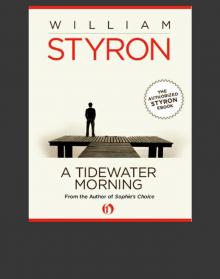 A Tidewater Morning
A Tidewater Morning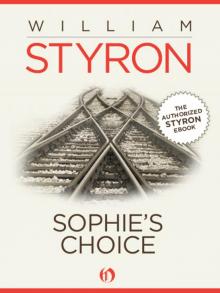 Sophie's Choice
Sophie's Choice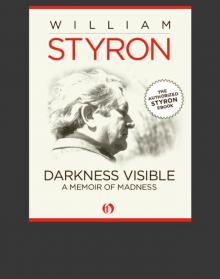 Darkness Visible: A Memoir of Madness
Darkness Visible: A Memoir of Madness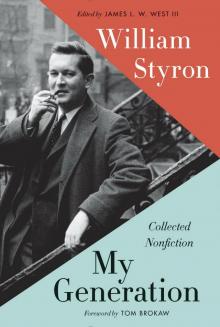 My Generation: Collected Nonfiction
My Generation: Collected Nonfiction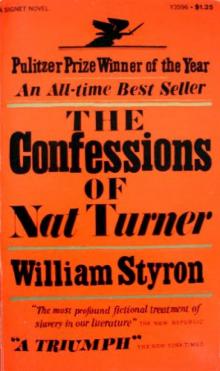 The Confessions of Nat Turner
The Confessions of Nat Turner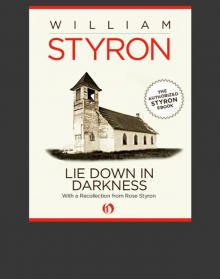 Lie Down in Darkness
Lie Down in Darkness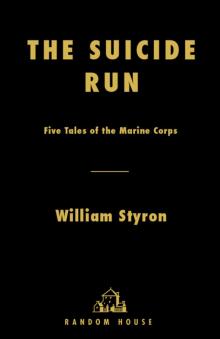 The Suicide Run: Five Tales of the Marine Corps
The Suicide Run: Five Tales of the Marine Corps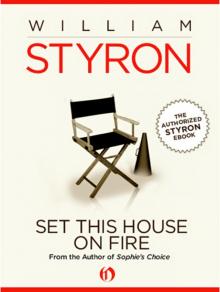 Set This House on Fire
Set This House on Fire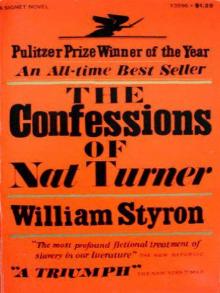 Confessions of Nat Turner
Confessions of Nat Turner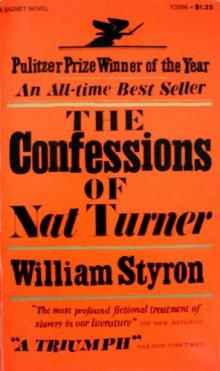 The Confessions of Nat Turner (1968 Pulitzer Prize)
The Confessions of Nat Turner (1968 Pulitzer Prize)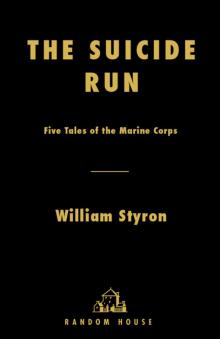 The Suicide Run
The Suicide Run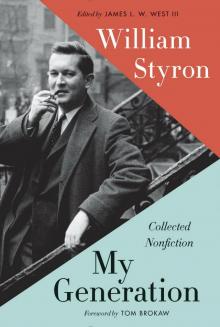 My Generation
My Generation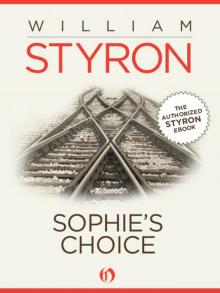 Sophie's Choice (Open Road)
Sophie's Choice (Open Road)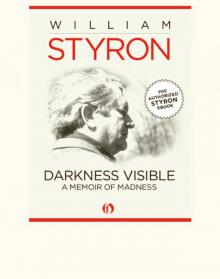 Darkness Visible
Darkness Visible